Select Language
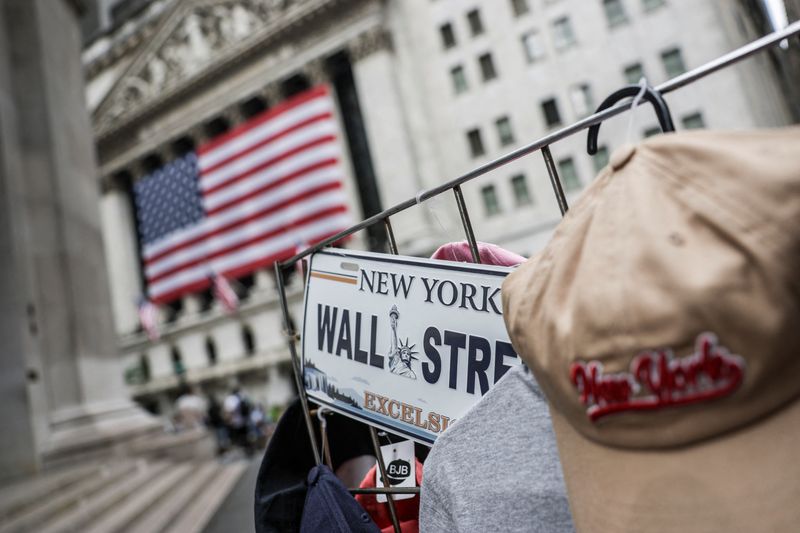
1. Trade agreements still in focus
Trade negotiations remain in the spotlight at the end of a week that has seen the U.S. sign new deals with Japan, Indonesia and the Philippines, adding to previously announced agreements with the U.K. and China.
A European Commission spokesman said on Thursday that a deal between the European Union and the U.S. on trade tariffs is "within reach", ahead of the August 1 deadline when U.S. President Donald Trump has threatened to impose a sweeping 30% levy on EU imports.
Such a deal is likely to result in a broad tariff of 15% applying to EU goods imported into the United States, Reuters reported, citing two diplomats.
Additionally, the U.S. is set to engage in fresh trade talks with China next week, with the Wall Street Journal reporting on Friday that President Donald Trump is seeking more economic concessions from Beijing.
The U.S. and China agreed in May and June to substantially lower their respective trade tariffs on each other, and signed a framework trade agreement.
But both sides are now attempting to clinch a bigger deal, with the U.S. still maintaining tariffs of between 30% to 50% on Chinese goods.
2. U.S. futures gain on solid earnings
U.S. stock futures edged higher Friday, with Wall Street on course of a winning week as investors celebrate a generally positive earnings season to date.
At 03:10 ET (07:10 GMT), the S&P 500 futures traded 45 points, or 0.1%, higher Nasdaq 100 futures gained 10 points, or 0.1%, and Dow futures rose 20 points, or 0.1%.
The main Wall Street indices are all on course to finish the week with gains, with the blue chip Dow Jones Industrial Average set for an almost 1% advance on the week, as is the tech-heavy NASDAQ Composite, while the S&P 500 has risen about 1.1% week to date.
Almost 83% of the 155 S&P 500 companies that have reported to date beat Wall Street’s expectations, helping both the latter two indices to fresh all-time intraday and closing highs on Thursday.
Recent trade deals between the U.S. and its trading partners have also helped push the market to new heights, and investors are now awaiting any further trade announcements before the Trump administration’s Aug. 1 tariff deadline.
There are more earnings to digest Friday, including from the likes of HCA Holdings (NYSE:HCA) and Charter Communications (NASDAQ:CHTR), while there will also be durable goods orders for June to study, ahead of next week’s Federal Reserve meeting.
3. Trump/Powell clash again, over costs
Trump and Federal Reserve Chairman Jerome Powell clashed once again on Thursday, this time over the cost of renovations of the central bank’s Washington headquarters.
The U.S. president visited Washington on Thursday and focused on construction costs, pointing out that the renovation budget had increased from $2.7 billion to approximately $3.1 billion - a new figure that Powell disputed.
However, Trump seems to have moved away from firing Powell, at least for now, anyway.
"To do so is a big move and I just don’t think it’s necessary," Trump told reporters after his visit to the Fed’s headquarters, rowing back from recent attacks which have been seen as a threat to the Fed’s independence.
That said, the president still expressed his desire for lower interest rates multiple times during the brief press conference, the main reason behind his criticism of Powell as the Federal Reserve has paused its rate-cutting cycle amid uncertainty over the impact on inflation from the Trump administration’s trade policies.
4. Intel slumps on weak guidance
Intel’s shares traded sharply lower premarket after the chipmaker said late Thursday that it expects steeper losses than Wall Street forecasts in the third quarter and announced plans to slash jobs.
The company plans to reduce headcount to 75,000 by the end of year, down 22% from the end of 2024, which will be through attrition and "other means".
Additionally, as part of an effort to improve capital efficiency, and cut down costs, Intel (NASDAQ:INTC) said it has ditched plans to build projects in Germany and Poland.
The company also said it would slow the pace of construction of its chip factory in Ohio "to ensure spending is aligned with market demand."
Investors seem to be concerned that the company appears more focused on cost cutting than restoring its technological edge in a very competitive sector.
5. Crude gains on trade optimism
Oil prices rose Friday, adding to the previous session’s sharp gains, supported by hopes of more U.S. trade deals ahead of President Donald Trump’s nearing deadline.
At 03:10 ET, Brent futures climbed 0.9% to $69.78 a barrel, and U.S. West Texas Intermediate crude futures rose 0.9% to $66.61 a barrel.
Both contracts jumped more than 1% on Thursday after data showed a sharp decline in U.S. crude inventories.
The crude markets have gained support from the prospect of more trade deals between the United States and trading partners ahead of an August 1 deadline for new tariffs on goods from an array of countries.
The United States and Japan unveiled a trade deal on Wednesday, and confidence in growing that the European Union was also moving toward a deal [see above].
Easing trade tensions boosts economic activity and cross-border commerce, which in turn drives up oil demand through increased transportation and industrial energy use.
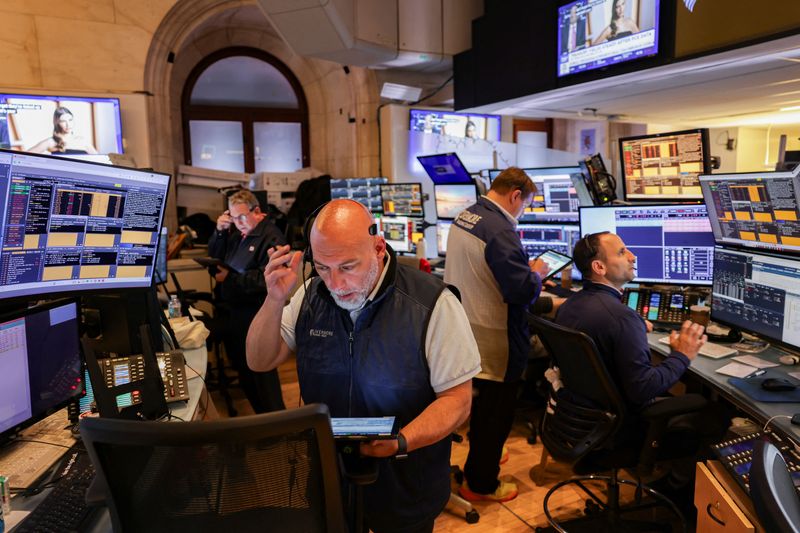
1. Futures mixed
U.S. stock futures hovered around both sides of the flatline on Thursday, as investors assessed a wave of corporate earnings and reports of more progress in global trade negotiations.
By 03:35 ET (07:35 GMT), the Dow futures contract had slipped by 152 points, or 0.3%, S&P 500 futures were flat, and Nasdaq 100 futures had gained 51 points, or 0.2%.
The main averages on Wall Street jumped on Wednesday, with the benchmark S&P 500 logging its 12th record close of 2025 and the tech-heavy Nasdaq Composite finishing above the 21,000 mark for the first time. Equities were bolstered by a Financial Times report that the U.S. and European Union were making progress toward a trade agreement that would place a baseline 15% tariff on items incoming from the bloc.
The rumors, which were later confirmed by Bloomberg News, came after President Donald Trump announced a trade pact with Japan on Tuesday that also included a 15% levy on imports into the United States. Analysts said the developments have helped to ease longstanding concerns over uncertainty around Trump’s tariff agenda as an August 1 deadline for his elevated "reciprocal" tariffs to kick in inches closer.
With roughly a fourth of firms in the S&P 500 having now reported their latest quarterly earnings, the second-quarter reporting period has been widely robust -- 67% of these groups have topped analysts’ revenue estimates and 88% have surpassed earnings per share projections.
2. Alphabet revenue surges
Headlining the slate of results after the bell on Wednesday were Alphabet and Tesla -- the first of the so-called "Magnificent 7" mega-cap tech giants to open their books.
At Alphabet, second-quarter revenue soared by 14% versus a year earlier to a new all-time peak of $96.4 billion, boosted by strength at its all-important search and cloud division.
But the Google-parent’s returns were tempered by its massive spending on artificial intelligence, which executives have targeted as a crucial source of future growth. Google has been folding AI into its search business recently to fend off intensifying competition from startups like OpenAI and Perplexity.
AI also represents a major opportunity for Alphabet’s advertising segment, allowing the company to present firms with ad campaigns that can squeeze out more returns. Total ad sales came in at $71.3 billion for the quarter, up 10.4% year-on-year, while its core search business expanded by 11.7%.
Google’s cloud unit, which offers computing power to data centers, posted a 32% increase in sales to $13.6 billion.
Still, as it has been for many of its tech rivals, investors are keen to see how the company plans to monetize its heavy AI spending. Alphabet said capital expenditures this year would rise by 13% to around $85 billion. In 2024, the figure stood at $52.5 billion.
Shares of Alphabet rose by more than 2% in extended hours trading.
3. Musk warns of "rough quarters" ahead at Tesla
Automation remains a key focal point at Tesla as well, with the electric vehicle titan hoping that its plans for self-driving cars and robotics will help fuel new revenue sources that can offset fading automotive demand.
Headwinds from the impending expiration of a federal tax credit designed to incentivize EV sales are also looming. CEO Elon Musk, whose recent political connections with Trump have been a fresh source of controversy for Tesla, told analysts that the firm could see "a few rough quarters."
"I’m not saying we will, but we could -- you know, Q4, Q1, maybe Q2, but once you get to autonomy at scale in the second half of next year, certainly by the end of next year, I think I’d be surprised if Tesla’s economics are not very compelling," Musk said.
He added in an interview with the Wall Street Journal that Tesla remains in the "early stages" of its autonomous driving ambitions.
Weighed down by a sizable decline in automotive deliveries, group-wide revenue dropped by 12% to $22.5 billion. Net income slid to $1.17 billion, compared with $1.4 billion a year earlier.
Tesla’s shares slumped by more than 4% in after-hours dealmaking.
4. U.S. PMIs due out
On the economic data front, markets will be keeping tabs on the publication of flash purchasing managers’ index figures on Thursday.
Economists anticipate that the preliminary manufacturing PMI reading from S&P Global for July will come in at 52.7, down slightly from 52.9 in the previous month. A gauge of services activity is tipped to edge up slightly to 53.0 from 52.9.
Numbers above the 50-point mark indicate expansion.
Despite uncertainty around the trajectory of Trump’s aggressive tariffs, the U.S. economy has shown broad signs of resilience.
The stock market has touched record highs, retail sales have topped forecasts, consumer sentiment has improved and a sharp spike in inflation -- much feared after Trump revealed his "reciprocal" tariffs in April -- has not yet come to pass. However, analysts have flagged that the impact of the tariffs could materialize in the months ahead.
5. ECB decision
The European Central Bank is due to unveil its next policy decision on July 24, with investors widely anticipating that it will leave key interest rates unchanged.
Analysts widely expect the ECB to keep its key deposit rate steady at 2%.
At its last meeting in June, policymakers, bolstered by signs of flagging inflation and tepid economic activity in the 20-member euro zone, slashed rates by 25 basis points. It was the eighth reduction in a year, although it came with an indication from the ECB that it would likely pause in July, largely due to uncertainty around trade tensions with the Washington.
"[T]he ECB’s next steps will be heavily influenced by developments in the tariff dispute and its impact on growth expectations," analysts at Erste Group said in a note.
On Wednesday, the Financial Times reported that, along with a 15% tariff on European imports, an EU-U.S. trade agreement would see both sides waive levies on some products, such as spirits, medical devices, and aircraft. But the EU remains ready to unleash a potential 93 billion euro package of retaliatory duties if a deal cannot be reached by August 1, the report said.
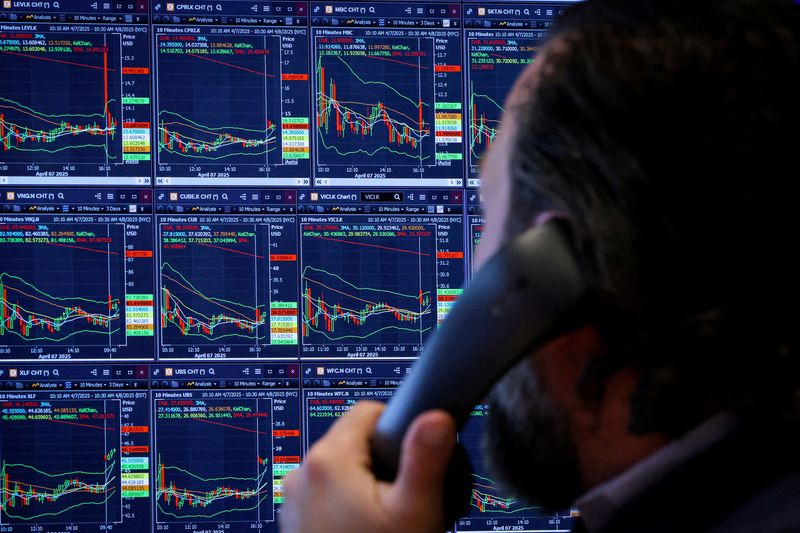
1. Futures muted
U.S. stock futures were subdued on Tuesday, as investors took a breath before a fresh round of corporate earnings.
By 03:31 ET (07:31 GMT), the Dow futures contract, S&P 500 futures, and Nasdaq 100 futures were all mostly unchanged.
The benchmark S&P 500 and tech-heavy Nasdaq Composite both touched record levels in the prior session, partly fueled by optimism around recent company results.
Shares of Google-owned Alphabet (NASDAQ:GOOGL) climbed, in particular. The search giant is due to kick off earnings from the crucial “Magnificent Seven” group of mega-cap tech names on Wednesday, along with electric vehicle manufacturer Tesla (NASDAQ:TSLA). Elon Musk-led Tesla’s stock price inched down on Monday.
Verizon Communications (NYSE:VZ) shares, meanwhile, added around 4%, driven by the telecom company’s decision to raise the lower end of its annual profit growth guidance.
While earnings season has been shifting into higher gear (see below), markets have also been keeping tabs on developments around sweeping U.S. tariffs. An August 1 deadline for President Donald Trump’s elevated “reciprocal” levies to take effect is inching ever closer, with media reports suggesting that the White House has yet to make significant progress on trade negotiations with a host of nations.
How Corporate America plans to respond to potentially heightened duties remains a key feature of the second-quarter reporting period.
2. Earnings ahead
Traders will now be monitoring a series of company earnings reports due out on Tuesday.
Of note will be figures from home builders DR Horton (NYSE:DHI) and PulteGroup (NYSE:PHM), which could offer a glimpse into the state of U.S. real estate market. Home demand has been weighed down recently by higher mortgage rates and broad economic uncertainty — although possible Federal Reserve interest rate cuts later this year could bolster home buying activity, analysts have suggested.
General Motors (NYSE:GM) has already warned of a $4 billion to $5 billion annual earnings headwind from U.S. tariffs, but investors may be curious to hear more on the trade outlook from the carmaker.
Also highlighting the docket today will be results before the opening bell from soda titan Coca-Cola (NYSE:KO) and tobacco firm Philip Morris International (NYSE:PM), as well as defense names like RTX Corp. (NYSE:RTX) and Lockheed Martin (NYSE:LMT). Chipmaker Texas Instruments (NASDAQ:TXN) and medical devices company Intuitive Surgical (NASDAQ:ISRG) will post returns after the markets close.
Following the end of trading on Monday, NXP Semiconductors (NASDAQ:NXPI) unveiled a 6% fall in second-quarter revenue that stemmed from weakness at its communications and infrastructure segment. Shares dropped in extended hours trading.
3. OpenAI-SoftBank’s AI project ramp-up struggling, WSJ reports
A $500 billion mega-deal between OpenAI and Japanese tech investor SoftBank to rapidly build out the artificial intelligence ambitions of the U.S. has struggled to get off the ground, according to a Wall Street Journal report.
Cuiting people familiar with the matter, the paper said that the project, known as "Stargate," has sharply scaled back its near-term plans. Roughly a half of a year after Stargate was announced by OpenAI CEO Sam Altman, SoftBank’s billionaire leader Masayoshi Son and President Trump, it has yet to sign a single deal for a data center, the WSJ said.
SoftBank and OpenAI have been dealing with disagreements over the terms of the partnership, including differences in opinion over where to build data center facilities, the WSJ added.
Despite having promised to "immediately" plug $100 billion into the initiative in January, the project is now looking to roll out a more modest data center, likely in the U.S. state of Ohio, later this year, the WSJ said. However, Altman and Son have said that their joint effort is progressing well.
In a note, analysts at Vital Knowledge suggested that the report could be a "tailwind" for Microsoft (NASDAQ:MSFT), as it could imply that OpenAI may have to keep more workloads on its Azure cloud product for "longer than envisioned."
"But it does raise questions about some of the hype that’s formed around the industry, where huge investment figures are cavalierly thrown out and used as justification for ever-expanding valuations when a lot of the numbers are either recycled, double-counted, or vaporware," the Vital Knowledge analysts argued.
4. Freight rail industry deal talk
Berkshire Hathaway-owned BNSF has hired Goldman Sachs to consider the purchase of a rival freight rail company, according to Semafor.
The news outlet noted that it was not clear whether BNSF would pursue a tie-up with Norfolk Southern (NYSE:NSC) or CSX Corp (NASDAQ:CSX).
Elsewhere, Jacksonville-based CSX is in talks to bring on financial advisers, Reuters reported.
These moves come after peer Union Pacific (NYSE:UNP), the biggest U.S. freight operator, reportedly began exploring a possible acquisition of Norfolk that would create a sprawling $200 billion rail network which would span the width of the continental U.S. It would be one of the most consequential deals in the sector since Canadian Pacific (NYSE:CP) fused with Kansas City Sourthern -- notably with Goldman’s help -- four years ago.
Analysts flagged that any potential deal may face scrutiny from U.S. regulators, raising questions around the appetite of the Trump administration for major transactions.
5. Gold edges down from one-month high
Gold prices fell slightly, pulling back slightly from an over one-month high hit in the prior session, due to some profit-taking and a modest rebound in the U.S. dollar.
The yellow metal’s safe haven appeal was recently boosted by reports that the European Union was preparing new countermeasures against the U.S. over Trump’s reciprocal tariffs. Washington seen seeking at least 15% tariffs on the bloc, but Brussels is looking to keep the rate at its current level of 10%, reports said.
Uncertainty over U.S. interest rates and the independence of the Federal Reserve also boosted haven demand. The Fed is widely expected to keep rates unchanged at meeting next week, despite growing calls from Trump that he cut borrowing costs immediately.
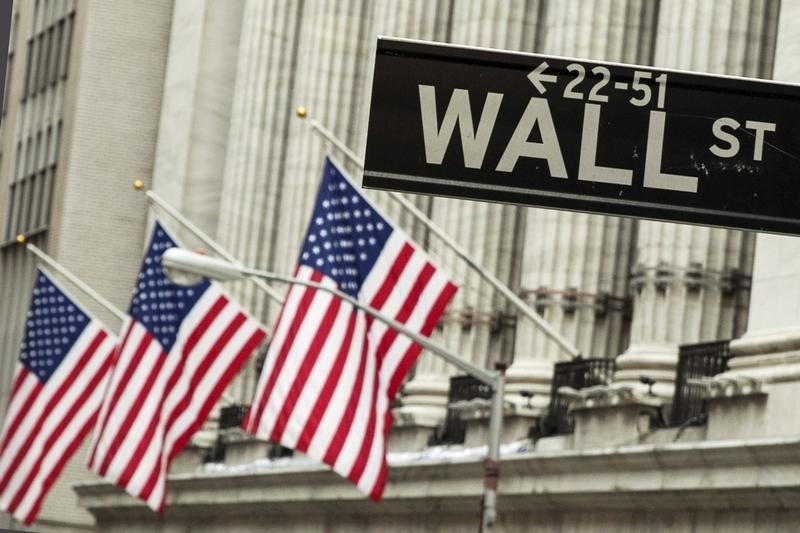
U.S. stock index futures moved higher on Monday as investors prepared for a string of key second-quarter earnings in the coming days, with some of Wall Street’s biggest firms set to report.
S&P 500 futures had risen by 18 points, or 0.3%, Nasdaq 100 futures rose 71 points, or 0.3%, and Dow Jones futures had climbed by 124 points, or 0.3%, by 05:24 ET (09:24 GMT).
Equities stalled near record highs on Friday as reports said President Donald Trump was pushing for a minimum 15% to 20% tariff on the European Union. Trump’s tariffs are set to take effect from August 1.
Tesla, Alphabet to headline earnings this week
Tech titans Alphabet (NASDAQ:GOOGL) and Tesla (NASDAQ:TSLA) are set to highlight a large slate of earnings this week.
The two, who will report on Wednesday, are part of the so-called "Magnificent Seven" group of mega-cap tech stocks and are likely to provide trading cues for the broader market.
Verizon Communications Inc (NYSE:VZ), Coca-Cola Co (NYSE:KO), Philip Morris International (NYSE:PM), RTX Corp (NYSE:RTX), Texas Instruments (NASDAQ:TXN), Chubb (NYSE:CB), Lockheed Martin (NYSE:LMT), and General Motors (NYSE:GM) are set to report on Monday and Tuesday.
A host of strong bank earnings helped keep investor spirits high last week, even as several major lenders warned of heightened economic uncertainty because of Trump’s trade tariffs. Much of the focus will now center around the impact of the levies on the operating outlook for the year.
Wall Street hovers near record highs despite tariff uncertainty
Wall Street indexes lost some ground on Friday amid persistent concerns over Trump’s trade tariffs. A report said that Trump was still considering a 15% to 20% baseline levy on the European Union.
The EU, for its part, has reportedly been pushing for the current 10% baseline U.S. duty on imports from the bloc to remain in effect.
Trump has outlined steep "reciprocal" tariffs against several major economies, which are all set to take effect from August 1. While the White House has signaled that trade negotiations are ongoing, the U.S. has so far struck a substantially smaller number of trade deals than Trump had promised earlier this year.
Concerns over the economic impact of higher tariffs kept investors on edge, and helped pull the main U.S. stock averages off record highs hit last week.
Oil prices slip
Elsehwere, oil prices inched down, swayed by concerns over the impact of trade tensions on demand and the effect of European sanctions on Russian crude supplies.
Brent crude futures had dipped by 0.6% to $68.89 per barrel, while West Texas Intermediate crude futures fell by 0.5% to $65.74 a barrel by 05:25 ET.
Last week, the EU approved a fresh set of measures against Russia over the longstanding conflict in Ukraine. The latest package particularly targeted India’s Nayara Energy, which exports oil products refined from Russian crude.
Analysts at ING flagged that the market had a muted reaction to the sanctions, arguing that traders are "not convinced" by their effectiveness.
But they said: "The part of the package likely to have the biggest market impact is the EU imposing an import ban on refined oil products processed from Russian oil in third countries."
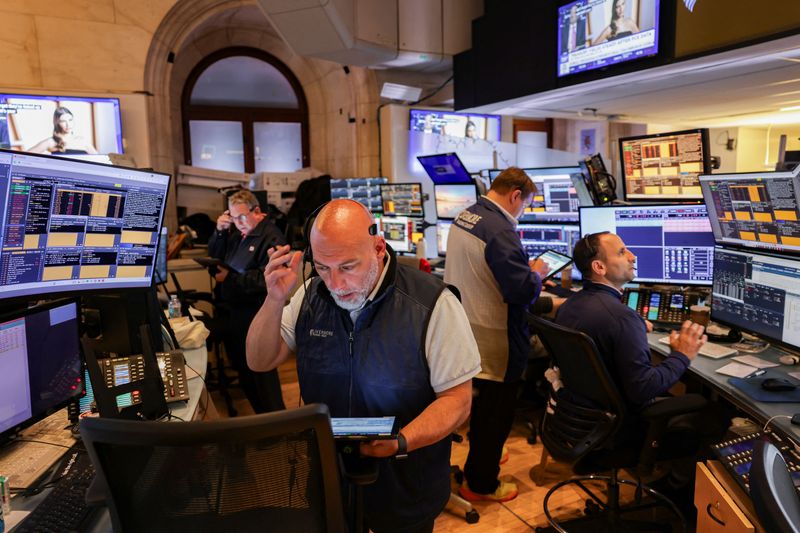
U.S. stock futures rise, with investors keeping a close eye on incoming earnings and economic data. Netflix’s (NASDAQ:NFLX) earnings top estimates, but shares in the streaming giant slip as analysts flag that its results may not have lived up to sky-high expectations. Elsewhere, a closely-watched consumer sentiment report is due out, while Bitcoin gains after U.S. House lawmakers pass three bills aimed at establishing a clear legal framework for digital assets.
1. Futures higher
U.S. stock futures ticked higher on Friday, suggesting an extension to gains posted in the prior session that were fueled by investor optimism around upbeat second-quarter earnings and signs of resilient growth conditions despite lingering tariff uncertainty.
By 03:51 ET (07:51 GMT), the Dow futures contract had risen by 64 points, or 0.1%, S&P 500 futures had climbed by 8 points, or 0.1%, and Nasdaq 100 futures had ticked up by 27 points, or 0.1%.
The main averages on Wall Street advanced on Thursday, with investors taking their cues from a series of favorable corporate results, as well as executive commentary that analysts have described as encouraging. Economic data this week has also indicated that U.S. economy is picking up some steam, even as inflationary pressures from President Donald Trump’s aggressive trade agenda appear to be mounting.
Economists have warned that levies could drive up prices and weigh on economic activity, although some doubts remain over the potential extent of the impact of the tariffs.
"[O]ur base case remains that the tariffs ultimately imposed will not cause a recession -- though we expect growth to slow," analysts at Capital Economics said in a note.
2. Netflix earnings
Shares in Netflix inched lower in extended hours trading after the streaming giant’s second-quarter earnings and outlook were solid, but failed to live up to heightened analyst expectations.
Fueled in large part by the success of the final season of its mega-hit series "Squid Game," Netflix posted quarterly diluted per-share profit of $7.19, above estimates of $7.08, according to LSEG data cited by Reuters.
Netflix, which has been pushing to fold in new offerings like live events to bolster viewership and draw in advertisers, also lifted its annual revenue guidance to a range of $44.8 billion to $45.2 billion -- up from $44.5 billion previously.
The company noted that the improved forecast was partly underpinned by a recent weakening in the U.S. dollar, which analysts at Vital Knowledge argued was a "low-quality source."
Investing.com analyst Thomas Monteiro also said the outlook "now feels quite conservative," adding that this is "problematic for a stock priced for perfection." Netflix’s stock price has surged by more than 43% so far this year, undergirded by hopes that the firm will continue to strengthen its position as one of the most dominant players in the streaming sector.
3. Michigan sentiment report ahead
On the economic calendar, investors will likely be keeping tabs on the release of a monthly tracker of consumer sentiment.
The gauge from the University of Michigan is tipped to have inched up in July, with inflation expectations holding roughly steady.
"We’ll see whether 1-year inflation expectations have continued to drop: they are currently at 5%, though opinions diverge sharply between Democrat (very high) and Republican (very low) responders," analysts at ING said in a note.
Friday’s release will come after separate reports this week painted a picture of an American economy that seems to be on solid footing, at least for the moment.
On Thursday, retail sales figures were stronger than anticipated and weekly jobless claims came in below forecasts. Inflation also stayed just about in line with expectations in June, although tariffs seem to be pushing the prices of some goods higher.
4. Fed’s Waller on rates
With this economic backdrop in mind, the Federal Reserve has largely adopted a "wait-and-see" attitude to future interest rate decisions.
However, Fed Governor Christopher Waller said on Thursday that a rate cut as soon as the central bank’s next meeting this month is justified, citing rising risks to the economy.
He added that the tariff-induced uptick in inflation will likely not be a persistent feature of the economy, but rather a more temporary bump.
"It makes sense to cut" the Federal Open Market Committee’s policy rate by a quarter of a percentage point at the Fed’s July 29-30 gathering, Waller said at an event.
The comments come as Fed Chair Jerome Powell has faced intensifying pressure from Trump to quickly slash borrowing costs to help bolster the economy. Powell, who has stressed the Fed’s independence from the White House, has defended a more cautious approach that will allow policymakers to assess the wider effects of Trump’s tariffs.
5. Bitcoin higher after U.S. House passes key crypto bills
Bitcoin temporarily rose above $120,000 in Asian trade on Friday, heading for its fourth consecutive weekly gain, as the U.S. House of Representatives cleared three bills aimed at creating a new regulatory framework for cryptocurrencies.
The world’s largest cryptocurrency last traded 1.1% higher at $119,583.3 as of 03:52 ET.
The token had surged to record highs above $123,000 at the start of the week. But profit taking at record levels and concerns around the final passage of crypto bills tempered gains.
One of the bills, known as the the "GENIUS Act," sailed through the House with a bipartisan 308-122 vote. It requires stablecoin issuers to hold high‑quality, dollar‑equivalent reserves and undergo regular audits, while establishing both federal and state supervision
Two additional bills also passed the House. The CLARITY Act aims to define whether digital tokens fall under the jurisdiction of the Securities and Exchange Commission (SEC) or the Commodity Futures Trading Commission (CFTC). Meanwhile, the Anti-CBDC Surveillance State Act, prohibits the Federal Reserve from issuing a central bank digital currency without explicit approval from Congress.

Kevin Warsh, a potential Federal Reserve chair pick by President Donald Trump, called for a major overhaul of the central bank during a CNBC interview Thursday.
Warsh said the U.S. needs a new "Treasury-Fed Accord" similar to the one established in 1951, describing the current economic situation as a "transformational moment" in economic history.
"The last thing we need is ’continuity’ at the Fed," Warsh stated, pointing to what he called a "credibility crisis" at the central bank.
While emphasizing that he "strongly believes" in the Fed’s independence, Warsh criticized the institution for focusing on diversity, equity and inclusion (DEI) and "full inclusive employment," calling this a "key mistake."
Warsh directly blamed the Federal Reserve for inflation and suggested its hesitancy to cut interest rates represents a further loss in credibility.
He also expressed support for President Donald Trump’s public criticism of the Fed, saying "Trump is right to be pushing Fed publicly."
Warsh concluded that the Federal Reserve "must get out of fiscal, political business" to restore its effectiveness and credibility.
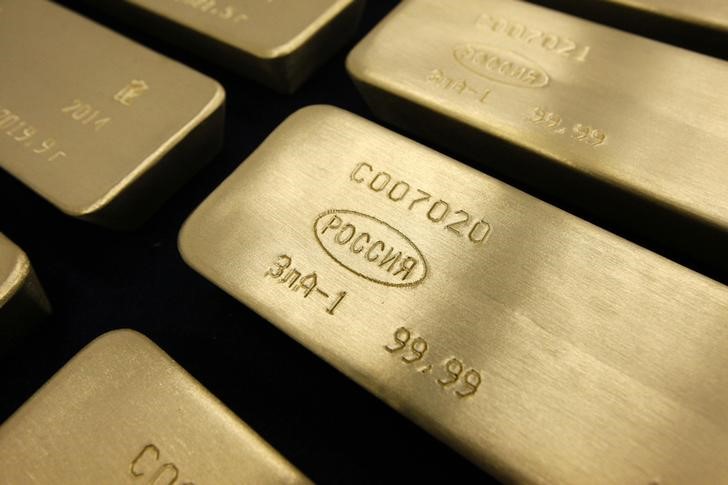
Gold prices rose slightly in Asian trade on Wednesday, recouping some overnight losses after stronger-than-expected U.S. consumer inflation data boosted the dollar and dented bets that interest rates will fall in the near-term.
Broader metal prices also rose on Wednesday, recovering some recent losses. Platinum and silver tumbled from recent peaks this week, as their outperforming gold drew in some profit-taking.
Still, safe haven demand for gold remained relatively underpinned by persistent concerns over U.S. President Donald Trump’s trade tariffs. Growing uncertainty over the Federal Reserve’s independence, amid growing calls from Trump and his allies for Chair Jerome Powell’s ouster, also factored into haven demand, as did tensions between Russia and Ukraine.
Spot gold rose 0.4% to $3,339.26 an ounce, while gold futures for September rose 0.3% to $3,345.40/oz by 01:32 ET (05:32 GMT).
Gold remains rangebound, other precious metals outperform
Despite seeing some gains this week, gold remained squarely within a $3,300-$3,500/oz trading range seen over the past three months. The yellow metal struggled to make headway amid increased speculation that gold prices were overbought after hitting record highs in April, with the yellow metal largely lagging other precious metals in recent months.
Platinum and silver raced past gold in recent months, with both metal prices reaching over decade peaks. Gains in both metals were in part driven by traders seeking more reasonably valued alternatives to gold, while expectations of improving demand and tightening supplies also helped.
Still, both metals retreated this week amid waning bets that the Fed will cut interest rates soon. Spot platinum steadied at $1,421.0/oz, while spot silver rose marginally to $37.8385/oz.
Dollar firms on sticky CPI, pressures metal prices
Broader metal prices were also quashed by strength in the dollar, which hit a three-week high on Tuesday after consumer price index inflation data read stronger than expected.
Among industrial metals, benchmark copper futures on the London Metal Exchange were flat at $9,639.70 a ton, while U.S. copper futures fell 0.4% to $5.4962 a pound.
Headline CPI read stronger than expected for June, albeit slightly. But the print still advanced from the prior month, raising concerns that inflation was turning sticky.
The CPI print also came amid increasing concerns over the inflationary effects of Trump’s trade tariffs.
The Fed has warned that it will keep interest rates unchanged until it has more clarity on the impact of Trump’s tariffs, with Tuesday’s print likely furthering this notion.
But the Fed’s stance has drawn increased ire from Trump and his allies, who were seen ramping up their calls for Powell’s departure and for interest rates to fall.
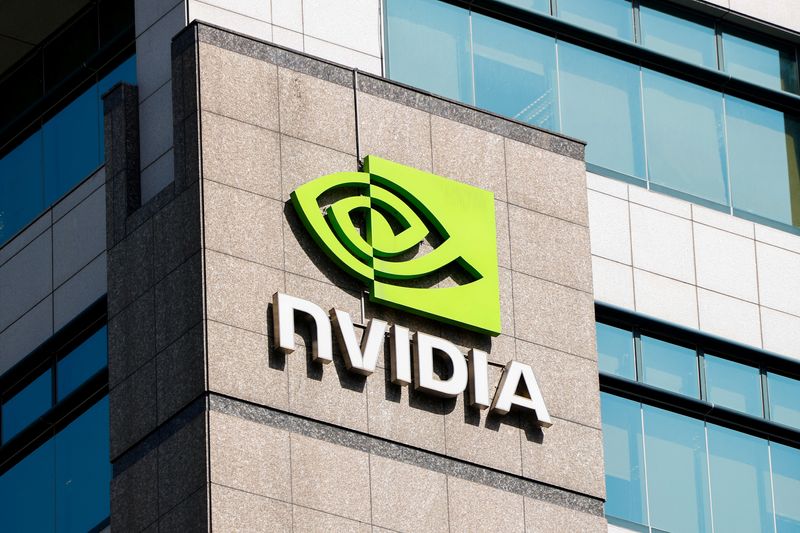
Semiconductor stocks rose on Tuesday after Nvidia (NASDAQ:NVDA) announced that it had received a green light to once again sell its artificial intelligence-enhanced chip in China.
Before the start of U.S. trading, shares of Nvidia had jumped by by more than 5%, lifting peers like Advanced Micro Devices (NASDAQ:AMD), Micron (NASDAQ:MU), Broadcom (NASDAQ:AVGO) and Marvell (NASDAQ:MRVL).
In Europe, regional chipmaking powerhouses like ASML (AS:ASML), ASM International (AS:ASMI), BE Semiconductor (AS:BESI), Infineon (ETR:IFXGn), and STMicroelectronics (EPA:STMPA) also rose.
Nvidia said on Monday that it will resume selling its H20 processor in China “soon,” as trade relations improve between Washington and Beijing, and after CEO Jensen Huang met with officials from both sides.
The AI-darling also announced a new graphical processing unit for China which it claimed was ideal for artificial intelligence smart factories and logistics.
Nvidia is “filing applications to sell" its H20 again and "the U.S. government has assured [...] that licenses will be granted,” the world’s most valuable listed company said in a statement.
The move comes after Washington lifted several restrictions on the export of chip technology to China, having recently allowed chip design majors including Synopsys (NASDAQ:SNPS) to restart sales in the country.
"[U]ncertainty around the U.S./China relationship [is] one key hurdle that could deter China’s offshore market in the near term, as we approach the August 12th U.S./China tariff truce expiration," analysts at Morgan Stanley said in a note, referencing the possible date when heightened U.S. levies could snap back into effect.
They added that "[w]hile it is too early to conclude," the developments "indicate some early signs" that U.S.-China trade relations were on the "right track."
Earlier this year, the White House had imposed even stricter licensing requirements for sales to China, effectively blocking Nvidia from selling its H20 chip in the nation. Nvidia had forecast at least $5.5 billion in charges due to the increased restrictions, underlining the importance of China to its operations.
But Washington and Beijing in May and June agreed to substantially lower their respective tariffs against each other, sparking hopes of a prolonged trade truce.
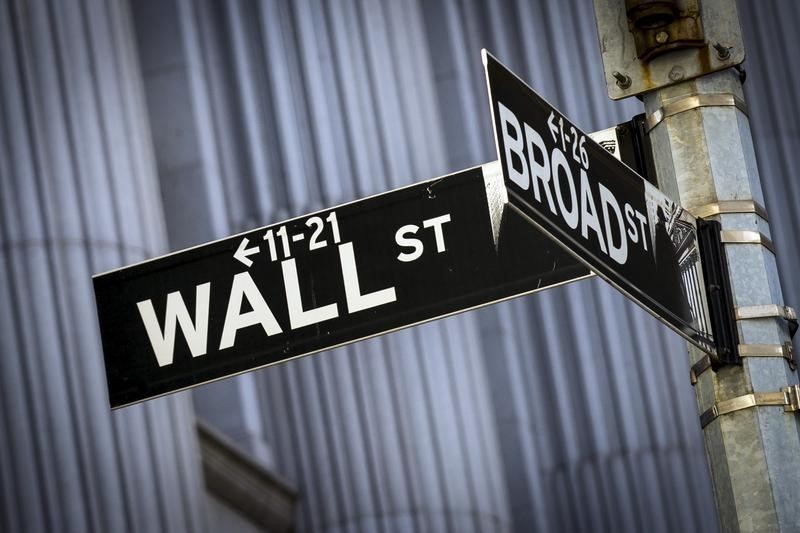
U.S. stock index futures fell Monday amid fears of an intensifying trade war after President Donald Trump slapped 30% tariffs on imports from Mexico and the European Union, after similar levies against Canada.
At 06:15 ET (10:15 GMT), Dow Jones Futures dropped 140 points, or 0.3%, S&P 500 Futures fell 19 points, or 0.3%, and Nasdaq 100 Futures slipped 65 points, or 0.3%.
The main Wall Street indices retreated last week, falling back from record levels, with the S&P 500, the NASDAQ Composite and the Dow Jones Industrial Average all snapping three-week winning streaks.
Trump imposes 30% tariffs on Mexico, EU
Trump over the weekend released more letters outlining trade tariffs on major U.S. trading partners, this time imposing a 30% levy on goods from Mexico and the European Union, respectively.
This came after Trump over the past week imposed tariffs on Japan, South Korea, Canada, and Brazil, as well as a 50% duty on all copper imports.
Trump’s tariffs will be effective from August 1, giving the targeted countries less than three weeks to reach a trade deal with Washington. He had postponed the deadline from July 9.
Speaking to reporters on Sunday, Trump said talks with South Korea and the EU were ongoing, with both countries seeking deals to avoid his steep tariffs.
Recent data showed U.S. customs duty collections surged to a record-high $113.3 billion gross in the first nine months of fiscal 2025 (the government’s fiscal year ends on September 30). Treasury Secretary Scott Bessent said this figure could reach $300 billion by December, representing a major source of fiscal revenue for the government.
CPI inflation, bank earnings due
The focus this week, away from Trump’s volatile trade policies, will be on consumer price index inflation data for June, due on Tuesday, as well as the new quarterly earnings season.
The June U.S. consumer price index is due on Tuesday, and the widely-watched inflation reading will offer Wall Street clues on when the Federal Reserve may next cut interest rates.
The CPI is expected to show a monthly rise of 0.3% in June, a rise from the 0.1% increase in the prior month, while the annual release is seen climbing to 2.6%, from 2.4% in May.
At its gathering in June, the U.S. central bank chose to leave borrowing costs unchanged at a target range of 4.25% to 4.5%, and Fed fund futures indicate a slim chance of a rate cut at the end-July meeting, but suggest easing in September is likely.
The new U.S. corporate earnings season kicks off in earnest this week, with major banks, including JPMorgan Chase (NYSE:JPM), Bank of America (NYSE:BAC) and Wells Fargo (NYSE:WFC), leading the way.
Results are also due from the likes of Netflix (NASDAQ:NFLX), Johnson & Johnson (NYSE:JNJ) and 3M Company (NYSE:MMM).
Crude pushes higher
Oil prices rose Monday as traders await news of potential additional U.S. sanctions on Russia that may affect global output.
At 06:15 ET, Brent futures climbed 1.5% to $71.42 a barrel, and U.S. West Texas Intermediate crude futures rose 1.6% to $69.57 a barrel.
Trump is due to make a "major statement" on Russia on Monday, having expressed frustration with Russian President Vladimir Putin due to the lack of progress in ending the war in Ukraine.
A bipartisan U.S. bill that would hit Russia with sanctions gained momentum last week in Congress, but it still awaits support from Trump.
European Union envoys are also seen to be close to agreeing another package of sanctions against Russia that would include a lower price cap on the country’s oil exports.

Gold prices rose in Asian trade on Friday, recouping some recent losses after safe haven demand was buoyed by U.S. President Donald Trump threatening more trade tariffs, while geopolitical tensions in the Middle East also helped.
Strength in the dollar– which was headed for a weekly gain– kept gains in gold and most other metals subdued on Friday. But silver and platinum were set for strong weekly gains, vastly outperforming gold as they notched fresh multi-year highs this week.
Among industrial metals, U.S. copper futures fell sharply from recent peaks, seeing some profit-taking after Trump’s tariff threat drove stellar gains in the red metal earlier this week.
Spot gold rose 0.5% to $3,341.27 an ounce, while gold futures for September rose 0.9% to $3,354.60/oz by 01:28 ET (05:28 GMT).
Trump’s Canada tariff threat, Middle East tensions boost havens
Trump on Thursday evening said he will impose 35% tariff on Canada from August 1, higher than his previously threatened 25% tariffs and also blindsiding Ottawa after some signs of improving trade relations.
The announcement sparked a risk-off move across major risk-driven assets, and spurred some gains in havens such as gold, and the yen.
On the geopolitical front, signs of little immediate deescalation in the Israel-Hamas war, as Jerusalem continued to launch attacks against the Gaza Strip, kept geopolitical tensions high in the Middle East.
U.S. efforts to broker a ceasefire appeared to have yielded little progress in the past week, despite the White House’s claims that a deal was close.
This trend offered gold some relief, although the yellow metal was nursing a muted weekly performance as it came under pressure from a recovery in the dollar. Speculation over the path of U.S. interest rates also weighed on gold, with the yellow metal remaining squarely within a $3,300/oz to $3,500/oz trading range seen for most of the year.
Platinum, silver greatly outpace gold in recent weeks
Platinum and silver prices steadied near multi-year peaks, and were headed for weekly gains of between 1.9% and 3%. Both metals shot past gold in recent weeks, as they both benefited from increased speculation over tighter supplies and increasing demand in the coming months.
Platinum was set for a sixth consecutive week of gains, as the white metal continued to benefit from a bullish industry report released in late-May. Platinum futures rose 0.3% to $1,420.25/oz and were close a 11-year high.
Silver futures rose for a third straight week, and were up 2.2% to $38.140/oz on Friday– their highest level in nearly 14 years.
Among industrial metals, COMEX U.S. copper futures fell 1.2% to $5.5620 a pound, seeing extended profit-taking after Trump’s threat of a 50% tariff on the red metal sparked strong gains this week. U.S. copper futures had briefly hit record highs.
Benchmark copper futures on the London Metal Exchange were flat at $9,700.55 a ton.

